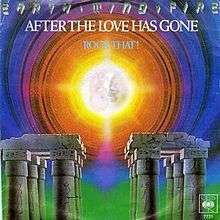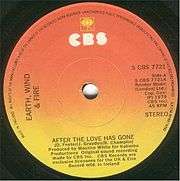After the Love Has Gone
| "After the Love Has Gone" | ||||
|---|---|---|---|---|
 | ||||
| Single by Earth, Wind & Fire | ||||
| from the album I Am | ||||
| B-side | "Rock That" | |||
| Released | July 12, 1979 | |||
| Format | 7", 12" | |||
| Recorded | September 1978 | |||
| Genre | R&B, Soul | |||
| Length |
4:24 (Album version) 3:55 (7" version) | |||
| Label | ARC/Columbia | |||
| Songwriter(s) | David Foster, Jay Graydon, Bill Champlin | |||
| Producer(s) | Maurice White | |||
| Earth, Wind & Fire singles chronology | ||||
| ||||
"After the Love Has Gone" is a 1979 hit single for Earth, Wind & Fire, written by David Foster, Jay Graydon, and Bill Champlin for the album I Am. It reached #2 on the Billboard Hot 100 singles chart for two weeks, behind The Knack's smash hit "My Sharona".[1]
Background
One of the song's writers, David Foster, worked on an album for Motown Records singer Jaye P. Morgan. The album was released in Japan and never took off in the United States. Foster later went to Motown to let the executives hear some of the material. Foster was in the middle of a song and ad-libbed the chorus to "After The Love Has Gone", as he had forgotten the words. Foster and Jay Graydon (Foster and Graydon would go on to record one album as a duo called Airplay) then asked Bill Champlin (a future member of Chicago, who would hold joint tours with Earth, Wind & Fire for many years) to write lyrics to the music after Graydon had come up with an idea for the verse. At the time, Foster was producing Champlin's 1978 solo debut Single for Full Moon/Epic Records and was working with Earth, Wind & Fire around the time they were recording their album I Am. Foster then showed Maurice White the song, which White loved and wanted to record. Foster and Graydon later told Champlin that the song was being pulled off his album for inclusion on Earth, Wind & Fire's album - to which Champlin agreed to having the track removed.[2] According to former manager turned Sony Music Entertainment CEO Tommy Mottola, Foster previously offered the song to Hall and Oates, but they rejected it, as they weren't interested in singing songs written by anyone other than themselves.[3]
Co-writer Graydon commented about the song's background:
| “ | David and I also recorded the song for the Airplay album, but that was not a problem since the EWF version was released before the Airplay album. By the way, the Airplay version is the original version of the song with the verses in the key of A. The EWF version verses are in the key of F, using a 'shotgun pivot chord' halfway through the B section as to get in the proper key for the choruses. Note that the EWF version features the high harmony part in the choruses, which makes the listener think that is the melody! That always bothered me since it is very difficult for one singer to sing the song as the vocal range is much too wide.[4] | ” |
Earth, Wind & Fire member Verdine White revealed that "After the Love Has Gone" was one of their most difficult songs to record:
"The track was based on a vibe. We cut it about six, seven times, and Maurice just said, "No, it's not right yet. We'll come back and get it tomorrow. It's not right yet". And then one day we nailed it, and it was right. The way it felt. It sounded like Earth, Wind & Fire".
Reception
"After the Love Has Gone" was nominated for a Grammy for Record of the Year and won for Best R&B Vocal Performance by a Duo or Group.[6] The song also won a Best R & B Song Grammy Award for Foster, Graydon and Champlin as its composers. "After the Love Has Gone" has been placed on Bruce Pollock's list of The 7,500 Most Important Songs of 1944-2000.[7]

"After the Love Has Gone" was very successful commercially, selling over a million copies in the US, and has been certified Gold, as up until the RIAA lowered the sales levels for certified singles in 1989, a Gold single equaled 1 million units sold; it has also been certified silver in the UK by the British Phonographic Industry.[8][9]
It was used to particularly haunting effect in a famous episode of the television series WKRP in Cincinnati which paid homage to the real-life disaster of the December 3, 1979, Cincinnati concert by The Who. Venus Flytrap, the night DJ portrayed by Tim Reid, played the song after his on-air announcement that numerous youngsters were killed by a stampede of concertgoers. The song was also heard on an earlier episode, in a scene where staffer Bailey Quarters was brooding over being stood up on a planned date with morning drive DJ Johnny Fever.
The Houston Rockets played this song for losses, as would many other professional sports teams, including the Chicago White Sox, Philadelphia Phillies and Charlotte Hornets.
Covers and samples
All three of the song's writers covered the song on the only album release by the band Airplay (a band made up of Graydon, Foster, and Tommy Funderburk) featuring Bill Champlin on chorus vocals in 1980, making it the second commercially released cover of the song, after James Last's version on his 1979 album The Non Stop Dancing Sound of the 80's.
In 1981, Lynn Davis released a version of the song on Stanley Turrentine's album Tender Togetherness.
In 1993, Jay Graydon also released a version of the song on his solo album (Airplay for the Planet) on which Bill Champlin provided the lead vocals. (As a trivia sidenote: At the time it was written, the song was originally intended for a solo album that Bill Champlin was recording [1978's (Single)], which was being produced by David Foster. The songwriters agreed to let Earth, Wind & Fire release the song first on the I Am album instead.)
David Benoit and Russ Freeman also covered the song, under their 1994 collaboration album, The Benoit/Freeman Project, with Vesta Williams and Phil Perry on vocals.
UK boyband Damage has covered the song, as well as artists such as Donny Osmond on his album Somewhere in Time and 112 on the album New York Undercover: A Night at Natalie's.[10] The song was sampled by Ryan Shaw in 2008.
Norman Brown also covered the song in his 1996 smooth jazz album Better Days Ahead.
Tommy Emmanuel and CDB released a version as the lead single from Emmanuel's 1998 album, Collaboration. The song peaked at number 74 in Australia.
Kurt Elling, a Chicago-based Grammy-winning jazz vocalist, covered this song on his 2011 release The Gate.
Filipino R&B singer Jay R covered the song on his 2008 album, Soul In Love.
Atlanta Georgia Producer IamSamIII and Cloumbus Ohio Songwriter DJReck Sampled the song on there album, College Woes 3 It's a Mixtape
Personnel
- Written and composed by - David Foster, Jay Graydon, and Bill Champlin
- Produced by - Maurice White
- Horns arrangement By - Jerry Hey
- Strings arrangement By - David Foster
- Saxophone [Solo] - Don Myrick[11]
Chart performance
Weekly singles charts
|
Year-end charts
|
References
- ↑ Dean, Maury (2003). Rock N' Roll Gold Rush. Algora. p. 289. ISBN 0-87586-207-1.
- ↑ Wiser, Carl. "Jay Graydon: Songwriter Interviews". songfacts.com. Songfacts, LLC. Retrieved 2016-03-08.
- ↑ Mottola, Tommy (January 29, 2013). Hitmaker: The Man And His Music (Hardcover ed.). Grand Central Publishing, Inc. ISBN 9781455505432. Retrieved 2016-03-08.
- ↑ 2014 interview with Jay Graydon on
- ↑ Prato, Greg. "VERDINE WHITE OF EARTH, WIND & FIRE". songfacts.com. Songfacts, LLC. Retrieved 2016-03-08.
- ↑ "Earth, Wind & Fire". Rock On The Net. Retrieved 2016-10-14.
- ↑ "After the Love Has Gone". Acclaimed Music. Retrieved 2016-10-14.
- ↑ "Archived copy". Archived from the original on 2014-05-10. Retrieved 2014-03-29.
- ↑ "Rock Music, etc., Terms". spider.georgetowncollege.edu. Retrieved 2009-03-23.
- ↑ Matthew Greenwald. "After the Love Has Gone - Earth, Wind & Fire | Song Info". AllMusic. Retrieved 2016-10-14.
- ↑ "Earth, Wind & Fire - I Am". discogs.com. Retrieved May 8, 2009.
- ↑ "Archived copy". Archived from the original on 2015-05-18. Retrieved 2015-05-11.
- ↑ "Archived copy". Archived from the original on 2015-05-18. Retrieved 2015-05-11.
- ↑
- ↑ "Image : RPM Weekly - Library and Archives Canada". Bac-lac.gc.ca. Retrieved 2016-10-14.
- ↑ "Top 100 Singles of 1979" Record Mirror January 5, 1980: 30
- ↑ "Top 100 Hits of 1979/Top 100 Songs of 1979". Musicoutfitters.com. Retrieved 2016-10-14.
- ↑ "Archived copy". Archived from the original on 2016-03-04. Retrieved 2016-04-12.